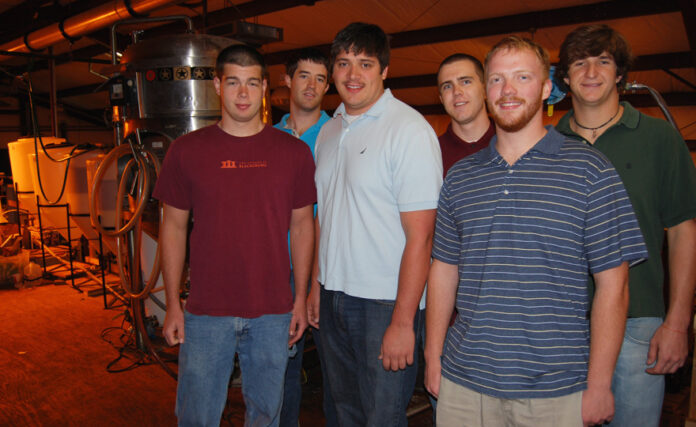
A group of Virginia Tech students have produced more than 200 gallons of biodiesel as part of a senior design project for the department of mechanical engineering. The Virginia Tech Bio-Fuels group is putting the fuel to direct use, running two pickup trucks on the liquid in a bid to not only stave off the use of foreign-bought oil but also to be environmentally friendly.
The B100 biodiesel is made from waste vegetable oil (WVO) obtained from local restaurants and processed in a nondescript warehouse along Virginia Tech’s Plantation Road, surrounded by fields dedicated to farm animals. The 200 gallons were made during the past two months, mainly by processing equipment donated to the student team.
The project is overseen by Foster Agblevor,associate professor of biological systems engineering for the College of Engineering and the College of Life Sciences and Agricultur. Agblevor already has made headlines with experimental alternative fuels such as converting poultry litter into bio-oil.
The project began in 2008 when the now senior team consisted of juniors. The first year consisted of planning, research, and obtaining the funding and needed equipment for the project. This year consisted of more research, design, construction of process equipment, and converting the WVO into biodiesel for consistent use. The group produces B100, or 100 biodiesel.
“In the summer, the viscosity of the 100 percent biodiesel is low enough to use,” said Christopher Block of Lake Forest, Ill., who received his bachelor’s degree in mechanical engineering in spring 2009. During winter months, certain biodiesels derived from animal fat have been known to gel or freeze in the tank. Therefore, the fuel must be mixed with regular petroleum to operate properly. “We learned via emissions testing that the B20 and B50 blends produce more favorable emissions than the B100 fuel,” Block said, referring to mixes that use 80 percent petroleum and 20 percent biodiesel, and an even split, respectively.
The group limited its project to 200 gallons of biodiesel because of space limitations at the warehouse, but could produce more if needed. For now, the team can make up to 50 gallons at a time, so the potential for fueling a small fleet is possible. Already there are some takers.
“We are building a new team for next year who will take it to the next level,” Agblevor said. “Giles County Wheatland Eco-Park would like them to install the unit on their property for education and other purposes.” An unnamed company is interested in commercializing the project, and that the university’s cafeterias could provide the waste grease product. “I will be encouraging [biological systems engineering] department to start using our biodiesel on some of the equipment that runs on diesel fuel,” he added.
Block will remain on campus next year as he pursues a master’s degree in mechanical engineering. He hopes to continue with the biodiesel project, but a permanent home for the operation must be found. The team had hopes to acquire a trailer so they could take the equipment around the state, including the Virginia State Fair, for tours. However, the idea proved too expensive.


Wow, if these boys can make alternative fuels, why can’t anyone else?